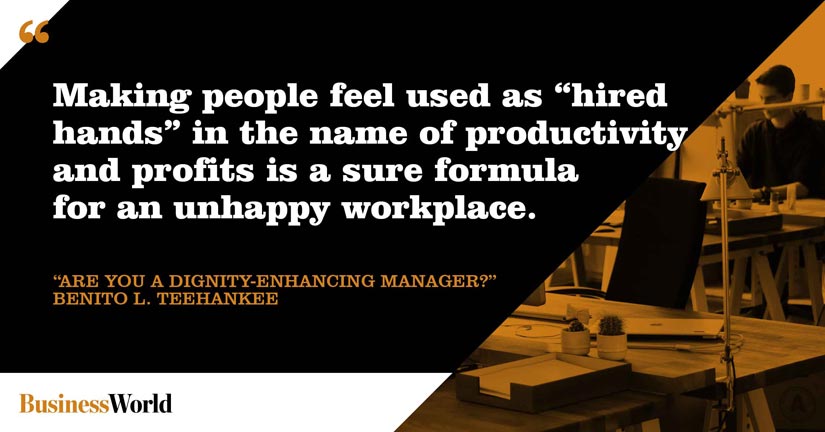
I was recently in New York to meet colleagues in the International Humanistic Management Association (IHMA). Over the three-day meeting hosted by Michael Pirson at Fordham University, we planned how to accelerate progress towards our vision in IHMA: “We envision a society and an economy that works for all. Such a society promotes organizing practices that honors the inherent value of all life and protects human dignity. Management practices in such an economy promote human well-being and focuses on flourishing of all life.”
A tall order, I know. But our small group of mostly business faculty from Italy, Mexico, the Philippines, Spain, and the United States feels we have an urgent goal.
In an era of worsening income inequality, workplace harassment, and the looming threat of artificial intelligence on jobs everywhere, we want to ensure that managers understand their role in building and maintaining workplaces that support the dignity and well-being of all workers.
I’m not surprised.
When I was studying management in the university, we were taught that managers were responsible mainly for achieving productivity results through people. Even though the main management functions of planning, organizing, leading, and controlling included leadership, people were seen as means to a goal and not ends in themselves. Making people feel used as “hired hands” in the name of productivity and profits is a sure formula for an unhappy workplace.
If you’re a manager who wants to bring out the best among those in the workplace, you won’t get far by using people. You’ll need to get people engaged and feeling like valued partners in the work. A sure path to do this is by honoring their dignity in the workplace.
Donna Hicks — IHMA adviser, Associate at the Weatherhead Center for International Affairs of Harvard University, and author of the upcoming book Leading with Dignity — gives plenty of advice on how to be a dignity-enhancing manager. Let me summarize and discuss just a few of her suggested best practices.
Accepting people’s identity. Managers tend to size people up based on status and power because business organizations are quite hierarchical. Also, the public has been led to believe that business leaders who achieve impressive financial outcomes are somehow a cut above the rest. Managers often forget that they stand on the shoulders of everybody else when achieving such outcomes. It’s important for managers to approach people as neither inferior nor superior to themselves. Employees need to feel free to express their authentic selves without fear of being negatively judged.
Recognition. Because managers rely on everybody else, they have to validate others for their talents, hard work, thoughtfulness, and help. Giving credit to others for their contributions, ideas, and experience definitely enhances dignity.
Acknowledgment. Managers spend a lot of time looking at their smartphones and computer screens, often multitasking in the process. As a result, many of them have a hard time focusing on people during face-to-face meetings and discussions. Subordinates need their managers to give them their full attention by listening, hearing, validating, and responding to what they are concerned about and what they have been through. Doing so may seem inefficient in the short-term, but the resulting bond of trust with subordinates is a good foundation for collaborative performance.
Inclusion. Managers need to be a unifying force in the organization. They can do this by making others feel that they belong in whatever level of the organization they may be.
Safety. Managers need to make people safe from physical harm, of course. But beyond this, employees also need to feel safe psychologically so that they feel free of concern about being shamed or humiliated, and can speak without fear of retribution. It takes an extremely secure manager to make employees feel safe enough to say what’s on their minds. The benefits for innovation and problem-solving are tremendous.
A new breed of dignity-enhancing managers is badly needed in organizations today. Will you be one of them?
Benito L. Teehankee is a professor of management at De La Salle University, member of the governing team of the International Humanistic Management Association, and vice-chair for CSR of the Management Association of the Philippines (MAP).


